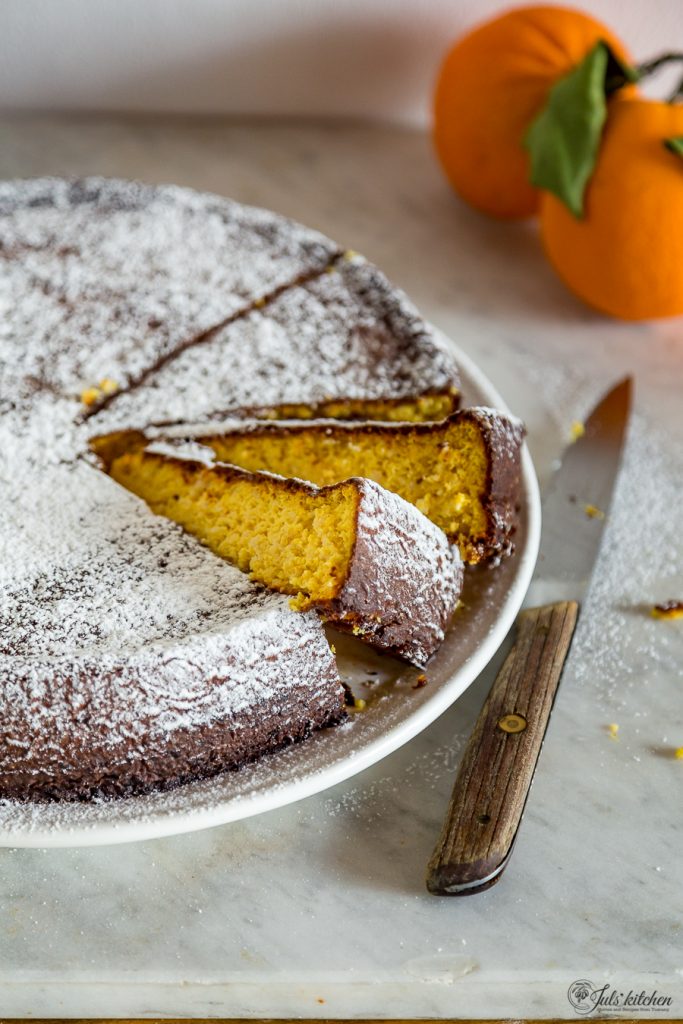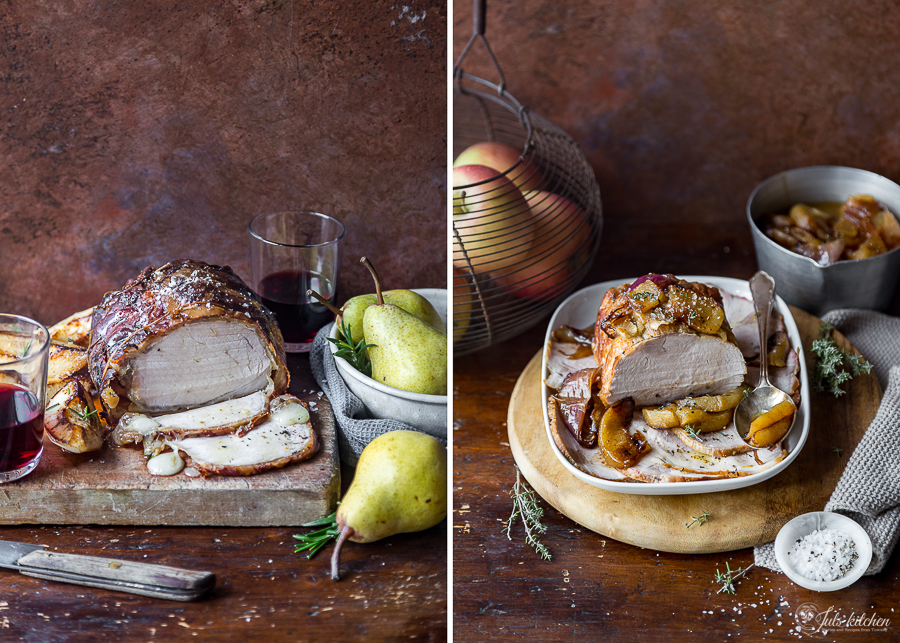Bread and apple pudding cake to celebrate
Nine years ago it was a shelf in my mum’s kitchen. This is where I began collecting my first spices and props, even when I didn’t know they could have a name, props. For me they were just cups, saucers and kitchen towels. When I open that shelf now, full of spices and flours and essences that my sister Claudia stores there, I still feel the same smell of hopes and new discoveries.
In that shelf I put my first cookbooks: I had just a few books at the time. I would browse reverently through them, wearing out the pages and staining them with splashes of tomato sauce. Nine years ago Juls’ Kitchen was a new born blog, everything depended on my spare time, my curiosity and my love for food.
This February Juls’ Kitchen is nine years old.
It is a proper kitchen, a studio, several shelves crammed with cookbooks, a prop room, a blog shared with my significant other.

It is the longest relationship I have ever had. I decided to start this blog to have a private corner where I could write about my love for food. It has been my therapy, my last hope, my first though in the morning. When all my friends were getting married or having children, I would answer the concerned questions of relatives and random people with a concise answer: I have a blog. Then I met Tommaso, who perfectly understood what this blog meant to me. He embraced the blog, all the food, the ups and downs, this unusual life and me.
When I began writing a blog it was a completely different world: imagine blogs before Social Media. All the content was here, in these pages, not scattered through Social feeds with updates and share now. Sometimes I miss those good old days, when you would almost feel like a pioneer, exploring an unknown world, meeting fellow enthusiastic bloggers along the way, building skills and a profession with practice and hard work.
A sniff into that shelf, though, a waft of cinnamon and cloves, and I feel like a pioneer again. You never stop learning and exploring. Every post here on the blog is as exciting as the first one. What is guiding me are these words by Molly Wizenberg, a blogger I admire for her honesty and hard work.
“Well, I want to write – or make pictures, or develop recipes; you can fill in the blank – I want to write well enough that my work markets itself. I want my work to speak for itself. I want my work to be good enough, alive enough, smart enough, that it spreads on its own merit. I am willing to work that hard. Maybe it sounds idealistic or audacious, but I think that should be the goal of everyone producing creative work.”

Caterina Maria Romula di Lorenzo de’ Medici
This is a month of birthday, as on February the 1st last year we also gave birth to Romula, our company.
Romula is the third name of Caterina de’ Medici. In 1533 the fourteen year old Caterina de’ Medici left Florence to marry the Dauphin of France, Henri d’Orleans. She brought with her a large following of courtiers, doctors, magicians, maids, her favourite cooks and pastry chefs, the influence of her wealthy family of bankers and also a closer attention to the table etiquette, something that was missing at the French court. She brought also spinach seeds. In between legend and reality, national pride and actual influences, it seems that the French culinary tradition owes to Caterina de’ Medici the introduction of gelato, sorbets, zabaione, crêpes, canard à l’orange, onion soup, forks and even panties. She loved riding astride, and this required that the ladies that imitated her would start wearing bloomers.
We chose an ambitious name for our company. Our mission is to work together to share this love for the Tuscan and Italian food, for authentic and genuine recipes. Caterina de’ Medici looked like a good example for this.
We were friends, then we fell in love. We began working together as freelancers, then we moved together. We built also studio. A company seemed like the right thing to do to officialise our shared projects. Who knows what this year will bring?

Bread and apple pudding cake
Bread and milk, two basic and soothing ingredients on its own. Then add a touch of vanilla, the moisture of apples, the richness of raisins and dried figs, the deep flavour of prunes. Imagine the comfort of simmering the milk in a saucepan with an open vanilla pod. That smell will permeate your kitchen and welcome you in the morning for breakfast.
I was searching for a celebratory cake, and I ended up with this humble breakfast bread and apple pudding cake. It completely suits the soul of Juls’ Kitchen.
Bread and apple pudding cake
Print Recipe Pin Recipe Share by EmailIngredients
- 450 g stale bread
- 750 ml whole milk
- 1/2 vanilla pod
- 60 g raisins
- 60 g prunes, roughly chopped
- 60 g dried figs, roughly chopped
- 2 tablespoons marsala, (or any sweet wine)
- 2 eggs, beaten
- 160 g sugar, plus some more to sprinkle on top
- 2 apples
- 70 g butter, melted
- 1 teaspoon baking powder
- 4 tablespoons breadcrumbs
Instructions
- Cut the stale bread in chunks and collect it into a big bowl.
- Heat the milk in a saucepan with the vanilla pod. When it starts to gently simmer, remove the vanilla pod and pour over the stale bread. Let it sit for about 10 minutes.
- Collect the raisins, figs and prunes in a bowl and soak with the marsala. Set aside for a few minutes.
- Preheat oven to 180°C.
- Mash the bread into the milk with a fork until you smooth. It must be very soft, but not too liquid. You can also use a blender.
- Add eggs, sugar, the peeled, cored and cubes apples, the baking powder and melted butter into the mashed bread and whisk until smooth. Add also the dried fruit infused with marsala and stir.
- Butter a 26 cm ring pan and sprinkle with half of the breadcrumbs and some sugar. Tilt the pan to coat it completely. Spoon the batter into the pan, smooth the surface and sprinkle with the breadcrumbs and two tablespoons of sugar. Add a few slivers of butter.
- Bake the cake for about 50 minutes - 1 hour, or until set and golden brown on top. Check the doneness with a toothpick inserted in the cake, it must come out clean, with no batter attached to it. Mind, though, that the cake will be still moist.
- Let it cool down for about 10 minutes on a wire rack, then tip it out onto a plate. Let it cool down completely before slicing.
- It keeps for a few days on your countertop, just cover it with some kitchen paper
Notes
Goodbye January
This is a new feature here on the blog I was planning to work on for centuries, let’s see if 2018 is the right year to start accomplishing some of my projects. It is a collection of recipes we made for clients and magazines outside of the blog, of interesting links and books, of Instagram photos we loved. A quick recap of the past month before we joyfully dive into the brand new month. So… Goodbye January.
January you’ve been short and busy, you gave me freezing days and an anticipation of spring, a long due holiday in Dublin, a Facebook group, Cooking with Juls’ Kitchen, and a hashtag on Instagram, #myseasonaltable, two working weekends and not enough sofa nights.
Dublin and Howth, the first holidays in more than one year, a short and well deserved break where we had pints of Guinness, long walks along the pier, hot and comforting seafood chowder. We ate our weight in bread and butter, because we were on holidays and calories do not count when you’re abroad. We walked for the whole day, from the Guinness Storehouse, where the toasted barley smell wafted through the icy air, to the Jameson’s Distillery, where we learnt the differences among Irish, Scottish and American whiskey.
I felt shivers down my spine when I entered into the Old Library at Trinity College and when I passed by Bewley’s, my favourite stop for breakfast when I last visited Dublin more than fifteen years ago. It was short, but intense, and left us with the desire to explore more.
What I loved and what I am reading
- Trattoria Sergio Gozzi in Florence. One of the positive aspects of Social Media is that you can read about this place, Trattoria Sergio Gozzi, in Piazza San Lorenzo in Florence, on Girl in Florence latest post and head straight to its door one hour later to try its fried meatballs. Georgette was right, they were absolutely delicious. Then I had a bowl of boiled meat with the best anchovy and bread salsa verde, which, I must confess, rivals my mum’s salsa.
- A tiny Frenchwoman has had a huge impact on food in America. Did you know that there was another woman who has been as influential and Julia Child in the spread of French cooking in the US? this is a beautifully written article which sheds some light into the life of Lulu Peyraud, a tiny electric spark of a woman who just celebrated her 100th birthday.
- Consider the Fork: A History of How We Cook and Eat by Bee Wilson. The chapter about measurements is so enjoyable and interesting, have you ever thought why cups work so well in the US? Bee Wilson managed to write a page-turner essay on how technology changed not only how we eat and cook, but also, and most importantly, our lives.
- The Kitchen Diaries by Nigel Slater. I loved The Christmas Chronicles as it took me by hands from November through the cold and magic months of winter. Now I am savouring page after page, recipe after recipe, this old book where Nigel guides us thought the year and the best seasonal ingredients.

Cadoro
Every month we contribute a recipe to Cadoro’s online magazine. January was dedicated to organic oranges, and the first recipe that came to my mind was Claudia Roden’s orange and almond cake, which calls for whole oranges, cooked for a few hours and blended into the cake batter. I made it also for our January Food Photography and Food styling workshop to style and photograph and everyone loved it, when we finally had it for lunch.
Here you can find the recipe in Italian.



Ci Piace Cucinare
As every month, once a week you can find my recipes in the Italian cooking magazine Ci Piace Cucinare. It is a lot of fun to develop the recipes and capture the final result, even more enjoyable is to eat all this fresh food, share it with friends and family or freeze it for the busy days. January was all about pork loin, alternative burgers (the beetroot and quinoa burger was our favourite) and vegetables flans.
What did you like this past month?
Books, posts, articles you’ve read, recipes you cooked? Share the love in the comments. And if you cooked recipes from Juls’ Kitchen, share them with the hashtags #julskitchen and #myseasonaltable. We’ll see on Thursday with a special recipe for pasta with meatballs… yes, just like in Lady and the Tramp.
 Ciao! Questo contenuto è disponibile anche in Italiano.
Ciao! Questo contenuto è disponibile anche in Italiano. 




Well, thanks for asking! I cooked Tuscan kale in farinata di cavolo nero and farinata con le leghe, with a lot of help from your book! Tried my hand at making my own mascarpone and butter too. And I have to admit that I was also rather homesick for Australia when I got back mid-January so I cooked things that reminded me of home like scones and pavlova (topped with winter fruit).
What a lovely cake you made using leftover bread to celebrate an important milestone for your website Giulia. I actually just posted on this subject and I ‘m always on the lookout for new ways to upcycle bread that didn’t get eaten. Hope to try it soon!
How good is home made mascarpone? It is addictive! You’re lucky to have two different culinary heritages to cook from, the original Australian one and the Italian one, how lovely is a pavlova in a cold Italian winter. Your onions stuffed with day-old bread look so delicious.
Happy blogoversary!! I miss the times when it was just blogs, it was so much more inviting! I told myself I would work on my blog more often and I will! Romula is a beautiful name, she could be my sister! Romula, Regula 🙂 x
We make something similar in the uk, called bread pudding. Not to be confused with bread and butter pudding, bread pudding uses leftover bread, dried fruit, butter, sugar, eggs and spices. It is baked, cut into squares and enjoyed with a cuppa. My mum made the best bread pudding!